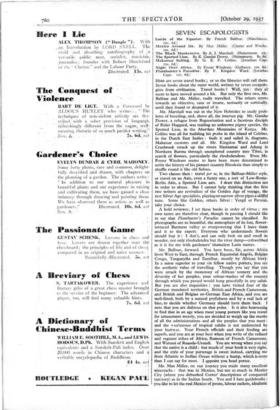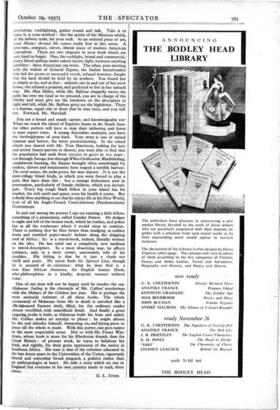SEVEN ESCAPOLOGISTS
HERE are seven travel books ; or so the libraries will call_them. Seven books about the outer world, written by seven escapolo- gists from civilisation. Traver books ? Well, yes : they:all seem to have moved around a bit. But only the first two, Mr. Balfour • and Mr. Miller, really travelled. The others strove towards an objective, sane or insane, seriously or comically, until they found or despaired of it. .
Mr. Marshall was out in the New Hebrides to study prob- lems of breeding, and, above all, the intersex pig. Mr. Gandar Dower, a refugee from Bognorisation and a facetious disciple of Rider Haggard, was trailing an unknown pigmy speties, the Spotted Lion, in the Aberdare Mountains of Kenya.' Mr.
Collins was all-for building his prahu in the island of Celebes, in the Dutch East Indies : built it and sailed it, diagrams, Makassar customs and all. Mr. Kingdon Ward and Lord
Cranbrook struck up the rivers Nati:M=2d and Adung in
Northern Burma through unexplored country into Tibet,- in search of flowers, particularly the rhododendron. Even Mr.
Foster Windram seems to have been more determined to settle the history of his pioneer country Rhodesia than simply to shuffle round it like old Selous.
Two classes then • - travel per se, in the.-Balfour-Miller style, or travel on an Axis, even a funny one, a sort of Low-Ronie- Berlin Axis, a Spotted Lion axis. I draw this distinction not
in order to abuse. But I cannot help thinking that the first two writers are revivalists of the Golden Age of voyage, the rest Silver.Age specialists, playing on narrow silver pipes a skilful tune. Some like Golden, others Silver : Yergil or Persius, take your choice.
A bold reviewer, I set these books in order of virtue ; my own tastes are therefore clear, though in passing I should like
to say that Plaathuntees Paradise cannot be classified. Its photographs are so beautiful, the atmosphere of its lost, flower- terraced Burmese valley so overpowering that I leave them and it to the expert. Everyone who understands fioweis should buy it : I don't, and can only look on and smell -in wonder, not only rhododendra but the river damp—cobwebbed as it is for me with gardeners' -shameless Latin names.
Mr. Balfour, forward. You have been, Sir, across Afria from West to East, through French Equatorial Angola, Belgian
Congo, Tanganyika and 7an7ibar, most' by 'African ' lorry.
In a sense superior to your six fellow native porters, you see
the aesthetic -value of travelling. Though you that you were struck by the monotony of African` scenery and the
diversity of her peoples, your colour-washes • of ,the country through which you passed would hang gracefully in any saloil.
But you are also inquisitive : you have visited four of the
German mandated territories, British and French Cameroons, and British and Belgian ex-German East Africa, and you are
well-fitted, both by a natural pryfulness and by a real lack of bias, to decide whether Germany should have them back. I note that you are dubious on that point. It it also heartening to find that in an age when most young porters like you travel for amusement merely, you are decided to weigh up the merits of all the administrations and all the peoples that you meet : and the a ealmesses of tropical sahibs is not undetected by your humour. Your French officials and their feeding are superb, and you are-at your best when you write of the refined ' and regnant tribes of Africa) Bamoun of French Cameroons, and Watussi of Ruanda-Urundi. You are wrong-when you say that the native is a child : but much of your book is very right, and the style of your porterage is sweet • indeed, carrying me from Atlantic to Indian OCean without a bump, which is more than I can say for most. I appoint you head porter.
Mr. Max Miller, on our journey you made many excellent wisecracks : that was in Mexico, but not so much in Mexico City (where you• debunked Cortez' -descriptions of conquered territory) as in the Indian South. You and I hate guidebooks : you like to let the real Mexico of peons, labour rackets, idealistic revolution, cockfightingl gather round and talk, Take it or :eave it, is your method . like the spittle of the Mexican which, in the railway train,-hit your sock. As an ordered piece of art, your Mexico Around Me comes really first in this series. A first-rate, _compact, clever, liberal piece of modern American journalism. There are two chapters in your book which are very hard to forget. One, the cockfight, brutal and commercial, weary blood spilling under naked electric light, between smoking gamblers : these Americans can write. The other, your meeting with the widow of General Zapata, the Indian horsebr-eaker who led the peons to successful revolt, refused honours, fought that the land should be held by its workers. You found her as simple as he, and as free : animals ran in and out of her poor house, she refused a pension, and preferred to live in her natural way. Mr. Max Miller, while Mr. Balfour elegantly waves the palm fan over my head as we proceed, you are in charge of the whisky and must give me the lowdown on the aborigines to right and left, while Mr. Balfour gives me the highdown. There is a human, equal side to them that he may miss, and you will not. Forward, Mr. Marshall.
You are a broad and steady carrier, and knowledgeable too- When we reach the island of Espiritu Santo in the South Seas, the other porters will have to stop their jabbering and listen to your expert voice. A young Australian zoologist, you have the forthrightness of your kind. Your story is one of mixed humour and horror, the latter predominating. In the island which you shared with Mr. Tom Harrisson, looking for bats and pretty honey-parrots to dissect, you were able to find that the population had sunk from 103,003 to 4,030 in too years : not through Savage, but through White Civilisation. Blackbirding, sandalwood hunting, the disease brought often unwittingly by traders, slavers and missionaries have reaped a terrible harvest. The coral waxes, the palm grows, but man departs.. It is not the inter-village blood feuds, in which you were forced to play a part, that have done this : but a strange listlessness now in procreation, particularly of female children, which you investi- gate. Every big rough black fellow in your island has his musket, his rich earth and game, even his health it seems. But nobody does anything to see that he enjoys life in his New World, Ie ist of all his Anglo-French Condominium (Pandemonium) Government.
In and out among the porters I can see running a little fellow, something of a picanninny, called Gandar Dower. He dodges to right and left of the beaten track, which he loathes, and pokes fun at all the resthouses where I would sleep in comfort. There is nothing that he likes better than trudging in sodden boots and tumbled papier-machi helmet along the dripping roof of Africa : his is a travel-book, indeed, literally written on the tiles. He has tried out a completely new medium in travel-description. In a most disarming way, he affects romance, and, in a most comic, unromantic tells of his troubles. His failing is that he is just a shade too shrill and petite. He never finds his Spotted Lion, though he is assured of its existence : what he does find is a new East African character, the English hunter Hook, who philosophises in a kindly, despotic manner without cease.
One of our men will not be happy until he reaches the sea. Makassar Sailing is the chronicle of Mr. Collins' wanderings with the Malays of the Celebes last year. His is perhaps the most seriously intimate of all these books. The whole ceremonial of Makassar from life to death is unrolled like a silk-laboured Eastern cloth, filled, for the ordinary reader almost overfilled, with unartificial detail. And finally a great seagoing prahu is built, as Odysseus built his boat and sailed. Mr. Collins makes no attempt to please : he might almost be the real islander himself, wiseacring on, and laying piece to piece till the whole is made. With this porter, one goes native in the most respectable sense. Not so with Mr. Foster Win- dram, whose book is more for his Rhodesian friends than for Great Britain : of pioneer stock, he turns to belabour his kind, and rightly, for their gross oppression of the native in Southern. Africa. His tone is that of the reformer educated in the last dozen years in the Universities of the Union, vigorously liberal and somewhat broad tongued, a politico rather than an anthropologist at heart He tells a story which no one in England but everyone in his own country needs to read, three times.
G. L. STEER.



























































 Previous page
Previous page